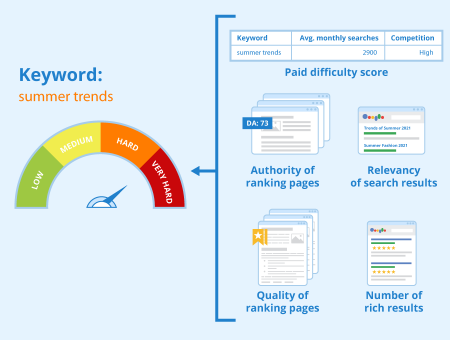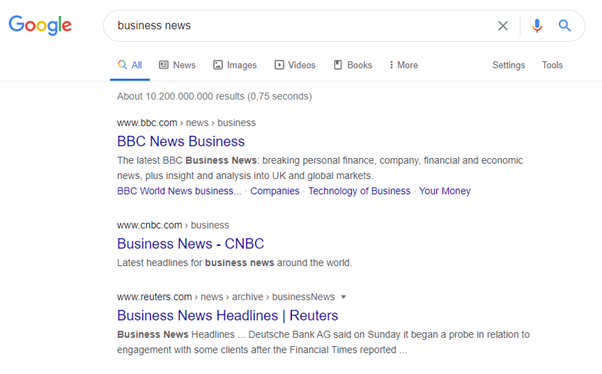What is Keyword Difficulty?

In SEO, keyword difficulty refers to how difficult it is to rank for a particular keyword. All SERPs are based on a keyword that is searched by a user. Since different searches result in different SERPs, different keywords have differing levels of competition. Keywords with a lot of competition, for example, due to the fact there are a lot of high-authority websites targeting that particular search phrase, have a high keyword difficulty. Keywords with less competition have a lower keyword difficulty.
Since keywords with a low difficulty are easier to rank for, finding these low-competition keywords is an important part of keyword research.
How is keyword difficulty measured
There isn’t a set formula for measuring keyword difficulty due to the fact the exact search engine ranking factors aren’t publicly available. However, there are many factors that are generally agreed upon by SEO practitioners, some of which have been disclosed or hinted at by search engines in the past. Below are some of the factors that may be taken into account when trying to measure a keyword’s difficulty.
Paid difficulty score – Google Keyword Competition
Google Ads provides a Keyword Competition score in their Keyword Planner which focuses on the paid difficulty of keywords. It measures how much competition there is for ads targeting a particular search term. When people are paying for ads, it means the keyword is worth money to people and could indicate more competition in organic search too.
Authority of ranking pages
The reputation of a page, otherwise called the authority of a page, is a clear indication of the keyword’s difficulty. If a SERP for a keyword is filled with high-authority websites, then it is safe to assume it is a difficult keyword to rank for.
Relevancy of search results
The relevancy of the search results is another important indicator of the difficulty of a keyword. If there are very few relevant search results, then a keyword may be easy to rank for. However, if the SERPs are filled with only relevant pages then it may be more difficult.
Number of rich results
If the SERP has many rich results, then a keyword has a lot of competition from search results provided by the search engine themselves. This can indicate a higher keyword difficulty since you’re competing with other search engine products.
Quality of ranking pages
By manually going through the pages that rank for a specific keyword, you can check the quality of the content. This can give you a better idea of whether it will be difficult to compete with the pages or not.

An example of a Google search for the search term “business news” that shows the top three results, which are all authority sites and indicates a high keyword difficulty.
Keyword difficulty tools
Keyword difficulty tools automate much of the keyword research process. These tools often provide a number between one and one hundred, with one being a low difficulty and one hundred being extremely difficult. Although these tools can make it easier to quickly filter through hundreds of possible keywords, many SEOs still use manual analysis to get a better insight into how difficult it will be to rank for a given keyword.
Importance for SEO
Keyword difficulty is an important part of SEO. By targeting keywords that have a low difficulty score and a high search volume, you can improve the effectiveness of your SEO campaigns. This can allow you to find content ideas with high demand and little supply.
Along with keyword difficulty, keyword relevance and search intent are two important parts of keyword research, as well as the volume of traffic a keyword can drive.
Since all SEO is based on the keywords and search terms that users use when searching, keyword research is vital to SEO.
Related links
- Keyword Research And Analysis: How To Find The Best Keywords For Your Website – Seobility Blog
- https://www.seobility.net/en/keywordcheck/
Similar articles
